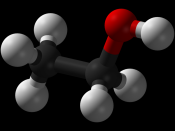An alternative fuel is any material or substance, other than petroleum. Some alternative fuels are biodiesel, ethanol, butanol, chemically stored electricity, hydrogen, methane, natural gas, wood, and vegetable oil. I think that ethanol and hydrogen might be the best.
Ethanol has been used since prehistory as the intoxicating ingredient in alcoholic beverages. Dried residue found on 9,000 year old pottery found in china shows the use of alcoholic beverages. Ethanol was first prepared synthetically in 1826, by Henry Hennel in Great Britain and S.G. Serulles in France. Ethanol was served as lamp fuel for pre-civil war United States and helped power early Model T Fords. But the price of ethanol couldnÃÂt compete with the low prices of petroleum at that time. Ethanol is a versatile solvent. It is miscible (miscible means that it is allowed to mix with different substances and form a single homogenous phrase) with water and most organic liquids.
The product of either ethylene hydration or brewing is an ethanol-water mixture. For most industrial and fuel uses, the ethanol must be purified. Fractional distillation can concentrate ethanol to 96% volume; the mixture of 96% ethanol and 4% water is an azeotrope with a boiling point of 78.2 ðC, and canÃÂt be further purified by distillation. So, 95% ethanol in water is a fairly common solvent. Purified ethanol contains no more than 1% water.
Hydrogen is a chemical element in the periodic table that has a symbol of H and atomic number 1. Hydrogen has an atomic mass of 1.00794 g/mol, hydrogen is the lightest element. It is also the most abundant, consisting about 75% of the universeÃÂs elemental matter. Stars are overwhelmingly exposed of hydrogen in its plasma state. Throughout the universe hydrogen is found in its plasma state. As plasma, hydrogenÃÂs electron and are not...


